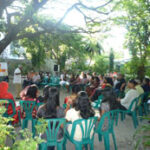The Dhivehi Rayyithunge Party (DRP) has expressed regret over the proposed 2010 mid-term budget, which it argues will fail to deliver on the development pledges of the incumbent government.
The largest opposition party said the budget had a deficit of Rf4.7 billion (US$366 million), noting that while Rf7.2 billion (US$560 million) is expected in revenue, this was accounted for 60 per cent of the budget.
“It is further doubtful that the revenue goals could be reached since a large part of the income rests upon taxes to be levied under laws that would be made in the future,” a statement from the party said.
Addressing MPs last week, Finance Minister Ali Hashim said the government had proposed a number of measures to generate around US$354 million to plug the deficit. These included foreign aid, foreign loan assistance, privatisation of government companies and the sale of treasury bills through the Maldives Monetary Authority.
In their statement, the DRP further noted that Hashim said government revenue depended on three new taxes, legislation for which was currently pending in parliament.
But, the party continued, the Rf3.4 billion (US$265 million) expected in tax revenue in next year’s budget was only three per cent higher than tax revenue in 2008.
Last week, Hashim urged MPs to pass the taxation legislation before the end of the year and said a goods and services tax would be imposed on tourist resorts and hotels in the final quarter of 2010, which he anticipated would raise Rf358 million (US$27 million) in revenue.
Revenue
The party further noted that at Rf333 million (US$26 million) revenue from profits of government companies was significantly lower than 2009 because of the government’s policy of selling off state assets.
DRP pointed to the government’s decision to sell seven per cent of its stake in the highly profitable Dhiraagu, the country’s first telecommunications company, to British company Cable & Wireless for US$40 million.
“We believe that another reason for the decrease of income from government companies is handing over management of these companies to unqualified people for political purposes,” their statement said.
Since coming to power, the government has introduced a policy of public-private partnerships it hopes will enhance the efficiency of state-owned enterprises.
Beyond the 40 per cent deficit, another of the issues raised by the DRP was the lack of funding for large development projects such as a national university,
“The extraordinarily high government expenditure casts doubts on the government’s talk of reducing expenditure,” the statement said, further claiming that a large portion of the total expenditure on government employees, Rf3.9 billion (US$304 million), would be spent on political appointees.
Even with the reduction of civil servants’ salaries and dismissals, expenditure on salaries is higher than previous years, the DRP said.
In August, the government announced a raft of austerity measures to help alleviate the budget deficit. These included pay cuts of up to 20 per cent for civil servants and all political appointees ranked deputy minister and above, cutting back on foreign trips, and letting go of all government-rented buildings.
Both the president and the vice-president also volunteered to take a 20 per cent pay cut to their salaries.
Despite a high number of political appointees, the government continues to maintain that it has made fewer appointments than the former administration.
“Benefit for the people”
In their statement, the opposition party described the interest on loans as “alarming”, noting that compared to Rf279 million (US$22 million) in 2008, the amount raised from interest in 2010 will be Rf529 million (US$41 million).
The party said that while the government’s policy was to reduce the size of the government, the proposed expenditure in 2010 will be higher than in previous years.
The DRP further pointed to the increase in foreign debt from Rf755 million (US$59 million) in 2008 to Rf1,057 million (US$82 million) in 2010, adding that the interest rate had not been revealed.
“Our only hope is that this mid-term budget will be amended for the benefit of the people and the country and pave way for development. We give full assurance to the beloved people that we will do everything we can in parliament,” the statement concluded.
Speaking to MPs at parliament, Hashim said that by the IMF government finance statistics measure, the deficit for 2009 was 26.1 per cent.
But, he added, if the mid-term budget was implemented, although there would be a decline to 14.8 per cent in 2010 and 2.4 per cent in 2011, it will reach a surplus in 2012.
Hashim said the structure of the budget was agreed upon after consultations with the International Monetary Fund and recommendations by the Asian Development Bank and the World Bank.




